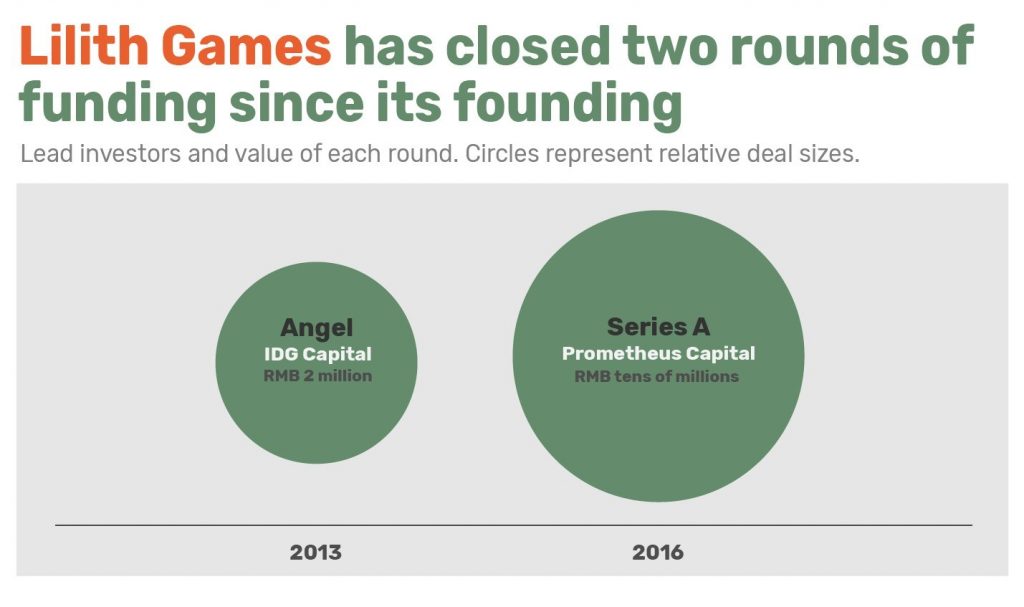Lilith Games was exploring overseas opportunities long before regulations tightened, beating larger and more well-known players to the punch.
As China’s domestic gaming market faces increasingly stringent regulation, many companies in the sector have started to focus more on overseas markets. Among the most successful is startup Lilith Games whose ads for the popular “Rise of Kingdoms” (ROK) strategy series are often peppered across western social media platforms. The most recent ROK title pulled in more than $60 million from abroad in October, helping the startup to beat both Tencent and NetEase in overseas mobile game revenue for the month.
The backstory: Lilith Games releases mobile strategy titles overseas first before rolling them out back home in China. The company aims to create games featuring universally appealing art styles and mechanics.
- Three former classmates, Wang Xinwen, Yuan Shuai, and Zhang Hao, founded Lilith Games in May 2013 in Shanghai. After graduating in software engineering at Nanjing University, they joined Tencent’s Aurora Studios in 2009 before leaving in 2013 to start their own project.
- The firm’s first mobile title, “Heroes Tactics,” targeted domestic gamers primarily, but follow-up releases focused on overseas markets.
Unique selling point: Different from most Chinese gaming firms, Lilith Games was exploring overseas opportunities long before regulations tightened, beating larger and more well-known players to the punch.
- The company’s first overseas-focused mobile title launched in 2015. Named “Soul Hunters,” the card-based strategy game was essentially the overseas version of “Hero Tactics” and accumulated more than five million downloads on Google Play alone.
- Lilith Games has been among the top five highest-grossing Chinese mobile game developers overseas in recent months. In October, the company beat Tencent and NetEase to be the top-grossing gaming firm on Apple’s App Store and Google Play in markets outside China.
“The cost of user acquisition has been rising faster than users’ spending capabilities, both domestically and in overseas markets. This is a problem for all gaming companies…What it means for us is that every customer is very valuable…We are increasingly focused on the long-term sustainability of our titles, whether it’s related to user retention or community management.”
—Lilith Games co-founder Zhanghao at Google Think Games in August
The investors: Lilith Games raised RMB 2 million in an angel round led by IDG Capital in 2013, before raising tens of millions of yuan in Series A funding from Prometheus Capital in 2016.
Present condition: Lilith Games’ newer releases have gained traction in the US and East Asia.
- ROK has pulled in more than $60 million across the App Store and Google Play in non-Chinese markets in October. The title beat Tencent’s “PlayerUnknown’s Battlegrounds Mobile” (PUBG Mobile) and “Call of Duty Mobile” to be the most profitable Chinese game for the month, according to Sensor Tower.
- Card-based RPG AFK Arena launched in April and was the eighth highest-grossing Chinese mobile game overseas in October, bringing in more than $30 million globally, according to Sensor Tower.
- Korea made up more than 45% of ROK’s October revenue, while the US contributed around 30%, according to App Annie. America also makes up close to 70% of AFK Arena revenue.
The landscape: Many Chinese gaming companies have looked to overseas markets after the State Administration of Press and Publication implemented tighter rules in April, limiting domestic game approvals.
- Lilith Games faces fierce competition. Tencent and NetEase are keen to further expand in the US and East Asian markets, while smaller players, such as Beijing-headquartered FunPlus and Shanghai-based Moonton, are also present.
- East Asian markets like Japan and Korea are among the most profitable globally. Mobile games revenue on iOS and Android increased more than 12.7% year on year in Japan in the third quarter, reaching $3.9 billion, according to a Sensor Tower report. During the same period, mobile titles grossed more than $1.1 billion in Korea, growing by 14.4% annually.
- Mobile games remain the largest video game segment this year and revenue is expected to grow 10.2% annually to $68.5 billion, or 45% of the global games market, according to researcher Newzoo.
Prospects: Lilith Games saw a significant rise in revenue in the past year after the release of more recent titles. As it continues to roll out content updates for its strategy and role-playing games—genres yet to be explored by Tencent and NetEase overseas—the startup could consolidate its position as top-grossing Chinese firm in the segment.
Lilith Games have also been working on bringing ROK and AFK Arena back home to Chinese audiences. The firm won SAPP approvals for AFK Arena in September and has completed beta testing ahead of a January 2020 launch.
– This article originally appeared on TechNode.







